
Guests
- Maher ArarCanadian citizen who was a victim of U.S. extraordinary rendition in 2002. He was seized at New York’s John F. Kennedy International Airport in September 2002 and sent to Syria, where he was tortured and interrogated in a tiny underground cell for nearly a year. He now works as a human rights advocate in Canada.
As Syria continues its brutal crackdown on demonstrators, we speak to a Canadian citizen who was repeatedly tortured by Syrian authorities after he was rendered to Syria by the United States in 2002. Maher Arar was seized at New York’s John F. Kennedy International Airport in September 2002 and sent to Syria, where he was tortured and interrogated in a tiny underground cell for nearly a year. He now works as a human rights advocate in Canada. “The cooperation with the Syrian government, as well as other dictatorships in the Middle East post-9/11, gave some kind of legitimacy to those dictatorships,” says Arar. He calls on the United States and the United Nations to declare the Syrian regime illegitimate and refer the matter to the International Criminal Court. [includes rush transcript]
Transcript
AMY GOODMAN: As we continue on the issue of Syria, we’re joined by Maher Arar, a former victim of U.S. rendition, now a human rights activist in Canada. Maher Arar was seized in New York’s Kennedy Airport in September of 2002, and he was sent to Syria, where he was tortured and interrogated in a tiny underground cell for more than 10 months. He ultimately was returned to Canada. The Canadian government awarded him $10 million for what he went through. Maher Arar joins us now from Ottawa, Canada.
Welcome to Democracy Now!, Maher. Talk about, first, what happened to you. This isn’t now, during this current uprising; this was during the Bush government — but how you feel it relates to the — what’s happening in Syria today.
MAHER ARAR: Basically, my experience allows me to relate to what is happening right now, in terms of the massive human rights abuses, whether it’s torture or atrocity, you know, crimes committed against civilians. I know firsthand how brutal this regime could be. But again, what is unique in my case, as compared to what is happening in Syria right now, is I was sent to Syria by the supposedly democratic government. The U.S. government sent me there against my will in 2002.
AMY GOODMAN: Now, for people who are not familiar with your story — and people can go to democracynow.org, because we have chronicled your story since you were captured by the — well, I shouldn’t say “captured,” because you were at Kennedy Airport transiting through to Canada after a family vacation. But briefly explain what happened to you.
MAHER ARAR: Well, basically, I was transiting in New York on my way to Montreal, and I was stopped by the New York police, and eventually the FBI showed up. I was interrogated for about 10 hours, almost until midnight. And then I was chained and shackled. I was not read my rights. I was told I didn’t have a right to a lawyer. And I was eventually accused of being a member of al-Qaeda, based on classified information that they did not want to share with me. Of course, today we know what information that is, because there was an extensive inquiry in Canada, which cleared my name and gave some facts about what happened. And then I was kept at the Metropolitan Detention Center in Brooklyn, New York, for about 10 days, after which I was bundled on a private jet to Jordan, from where I was transported to Syria and eventually psychologically and physically tortured.
I stayed in Syria, most of my time, in an underground cell which is the size of a coffin, basically. It’s about three feet wide, six feet high and about seven feet deep. It was a filthy place. It was dark. It’s basically — that’s why I always refer to it as a grave-like cell, because it reminds you of really a grave.
And I was eventually released and — because my wife had gone on a public campaign and pressured and lobbied the Canadian government to press for my release. And eventually there was an inquiry in Canada. There was a huge outrage, public outrage, here about what happened to me. And the inquiry took about three years, and reporters reported about what happened. I was eventually, you know, cleared. And the Canadian government was blamed for sending false information to their U.S. counterparts.
AMY GOODMAN: And you were awarded over $10 million by the Harper government, a Bush ally —
MAHER ARAR: Correct.
AMY GOODMAN: — which is extremely interesting here, although the U.S. government has never apologized for what happened to you.
MAHER ARAR: That is correct. I was — I launched a lawsuit upon my return, both in Canada and the U.S., separate lawsuits. The Canadian government chose to settle the lawsuit immediately after the inquiry. Unfortunately, the U.S. judicial system has been not very understanding and has been siding — or has sided with the U.S. government and took the U.S. government arguments, despite all the public information that exists today about what happened to me. And on top of that, the Prime Minister, Stephen Harper, apologized to myself and my family for what happened to us, even though the Canadian government role, when compared to the U.S. role, is really minor, in my opinion.
AMY GOODMAN: Now, this is very relevant to today, because I think most people would say the U.S. has not been an ally of Syria. And yet, in your case, it worked with Syria, though you said if they thought you were guilty of a crime, when you were taken from JFK, let them deport you to Canada, where you were a citizen, and let them try you. They actually sent you to Syria.
MAHER ARAR: Well, let me emphasize here, my case is probably unique in the sense that I was the only Syrian-born Canadian who was sent or renditioned to Syria from U.S. soil. But let me be clear here, there were many victims of rendition of Syrian origin who actually were rendered from Pakistan and other places to Syria. Now, why the — and let me also say that when the American government sent me to Syria, they knew exactly what they were doing. In fact, I can vividly remember what an ex-CIA agent said around 2004 about the rendition program. He basically something said like — if I remember correctly, his is name is Robert Baer. He said, “If you want people to be well interrogated, you send them to Jordan. If you want people to be disappeared, you send them to Egypt. And if you want people to be tortured, you send them to Syria.” And that’s exactly what ended up happening. So what this basically says is that whoever took the decision to send me to Syria, they knew, or they basically wanted me to be tortured in order to extract information, what we call today “torture by proxy.”
AMY GOODMAN: That was Robert Baer, the ex-CIA agent. So, what do you think this means about the U.S. relationship with Syria today, how much sway the U.S. has, what the U.S. should be doing right now? We just got reports from Damascus and from the border, Amnesty describing this as a scorched earth policy against — well, against the Syrian government’s own people, that the Syrian government, that Bashar al-Assad, is engaging in right now.
MAHER ARAR: Well, the U.S. government has a huge responsibility for a simple reason. The cooperation with the Syrian government, as well as other dictatorships in the Middle East post-9/11, gave some kind of legitimacy to those dictatorships. And it is now — the prime responsibility of the U.S. government is to put the pressure on the Syrian government.
For instance, two things that the U.S. government can do right now. First of all, they have to declare this regime to be illegitimate, and they have forfeited their right to rule. Second, I think they have to press — and we’re here in Canada doing this, I mean, human rights activists and myself are actually pushing our government here to take a lead to refer this matter to the International Criminal Court.
Right now, the international community, including the U.S., is using very soft language, in my opinion. And imposing sanctions on some elements within the regime will not put much pressure. I think what needs to be done right now is to declare this regime to be illegitimate and also to refer this matter to the International Criminal Court as soon as possible. And that, in my opinion, will make a huge difference in terms of putting pressure on the regime.
AMY GOODMAN: Maher Arar, I want to thank you very much for being with us. Again, he was the victim of U.S. extraordinary rendition. He was seized at Kennedy Airport, sent to Syria in 2002, where he was held in a tiny underground cell for almost a year. He was tortured, physically, psychologically. Ultimately, the Canadian government awarded him more than $10 million. He now continues to live in Canada with his family. His wife ran for public office, where Maher Arar is a human rights advocate today.

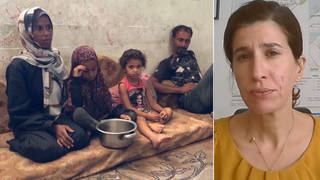
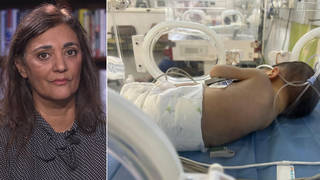
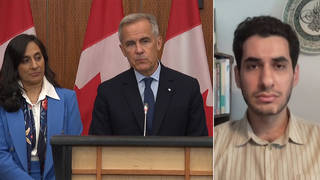






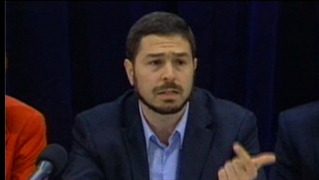

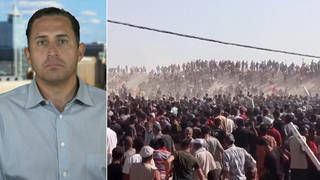
Media Options